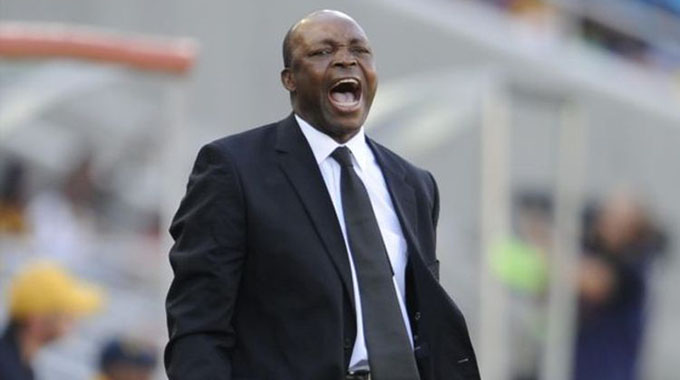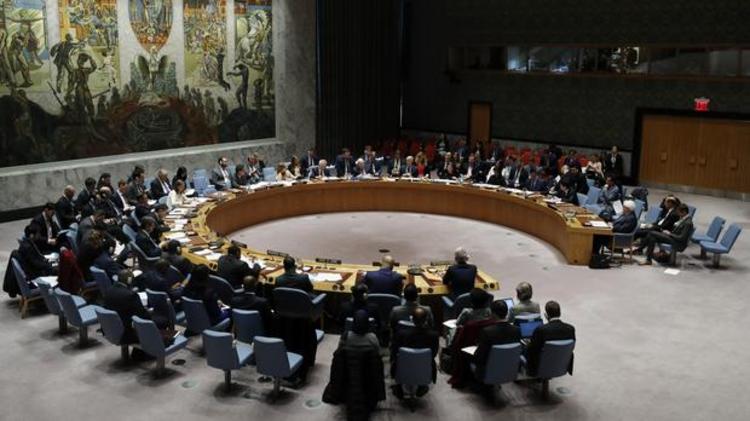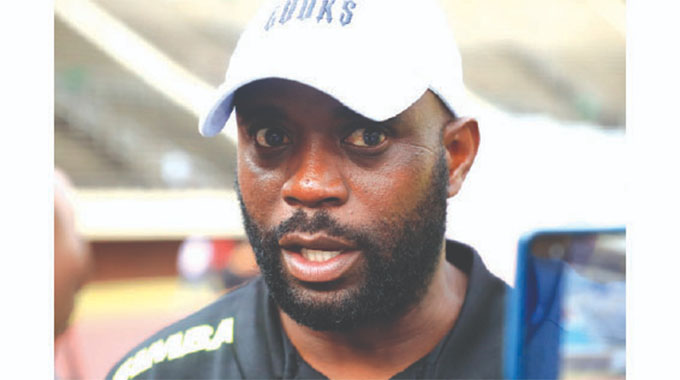Sharuko on Saturday

I BOUGHT a cake and some drinks for the troops on our sports desk on Thursday to celebrate that, after exactly a year in which our critics had feasted on us, and ridiculed us, a dramatic event in Polokwane the previous night had finally vindicated us.
That, after exactly 12 months in which the usual band of critics, whose only mission appears just to see evil, speak evil and hear evil about us, had been singing their songs of condemnation, we now had the privilege to have the last laugh.
And, as they say in this beautiful language of the Queen, those who laugh last have the luxury and the freedom to laugh longest.
Our crime, in the eyes of these band of critics, was that we had dared to take a very leading role in questioning the controversial way in which our Warriors had been eliminated from the CHAN finals at the hands of Namibia in a penalty shoot-out at the National Sports Stadium last July.
We were called all sorts of names, including crybabies, by some of our rival newspaper columnists, who even described us as a group of people whose blinkers had prevented us from seeing beyond the mediocrity of the Warriors show that afternoon and were trying to find cold comfort in that tragedy.
Some even said we were mere apologists for coach Sunday Chidzambwa.
And, rather than focusing on the way the gaffer had set up a team that failed to click into second gear that afternoon, including a surprise decision to entrust our goalkeeping duties with someone without a pedigree at this level, Herbert Rusawo, they accused us of spending our energy on a technicality they claimed didn’t exist and didn’t matter at all.
All we had done was question why the referee allowed the penalty converted by Namibia’s Dynamo Fredricks, which knocked us out in a 5-4 victory for the visitors, to stand.
Our argument was that the penalty was a ghost goal as it was technically flawed and, given that we had the benefit of reading the new regulations which guide this game, we said the referee should have ruled it as a missed kick even though it had rolled into goal.
We preached the gospel that Swazi referee Thulani Sibandze, who handled that match, had committed a diabolical technical error by somehow allowing Fredricks’ effort to be deemed a goal when the new rules and regulations had long outlawed such ways of converting penalty kicks.
We argued that once Fredricks came to a virtual stop after reaching where the ball was placed and feint his shot to dummy the goalkeeper before placing it the other side with the benefit of having seen that the ‘keeper had dived the wrong way, the effort had to be disallowed and noted by the referee as having been missed with the player being shown a yellow card.
We even sent footage of that penalty to the International Football Association Board, the sole authority when it comes to the crafting of laws and regulations governing world football, who provided an analysis that supported our position that referee Sibandze and his assistant Petros Mbingo should not have allowed that effort to stand, but instead should have noted it down as a missed penalty. In this respect in the Laws of the Game 2017 /2018, Law 14 states that it is an offence if the kicker “feints to kick the ball once the kicker has completed the run-up (feinting during the run up is permitted) . . . This law is applicable in Kicks From the Penalty Mark (KFPM) (Law 10),’’ IFAB technical director David Elleray exclusively told us back then.
“The guidance is that once the kicker has arrived at the ball, the run-up is completed and if the kicker then feints to kick, then this is an offence punishable by a caution YC (Yellow Card) and an indirect free kick (for a penalty in normal time) and the kick being declared “missed” in kicks from the penalty mark.
“This is regardless of the outcome of the kick (until the changes for 2016 /2017) if the penalty was ‘illegally’ scored, then it was retaken, but the philosophy now is that the player knows he/she cannot feint at the end of the run, so if he/she does so, they forfeit the kick and get a YC (Yellow Card).”
But even when the Confederation of African Football suspended Sibandze and Mbingo for the technical error, we were not spared harsh criticism, including some which came from readers of this newspaper, and this is part of the vicious feedback I got on the official website of this newspaper:
Chaitemura
“Sharuko you should have been a politician, a Zanu-PF politician at that, you always see conspiracy everywhere you go. Why do you think Zimbabwe is hated by all the officials?’’
Bango
“This Sharuko, I watched the match yesterday and Zim could not even complete three passes. Namibia was far much better and you (then) hear a stupid Sharuko blaming the ref. Go get a life liar.’’
Guest
“It’s typical of you Sharuko to support Sunday Chidzambwa even if it means lying through the skin of your teeth. We need to move forward nebhora redu by being truthful sometimes.’’
Kwangwari Gwaendepi
“We should never have settled for penalties in the first place. Our boys didn’t deserve to win, period. Let’s not use referees as a scapegoat. This was an awful performance by the Warriors.’’
Rasta
“He clearly states the team put up a pathetic show, but proceeds to put forward a conspiracy theory. The team plays like crap and you still expect to win? Sharuko is not objective enough to be a journalist.’’
Mukotami
“It’s so pathetic for Sharuko to come up with these conspiracies against such a spirited, disadvantaged team, The Warriors were pathetic period. But this Sharuko guy sees ghosts for real, come on maBlazo please, we know you have a privileged platform to write stories, but do not abuse it please.’’
Of course, others saw things differently in that feedback dominated by negativity and here are some of their comments:
Washington Chimalizeni
“No! No! No! Kana pakanywa, pakanywa chete irregardless yekuti nezuro we complained or not. Sharuko is right whether Zanu-PF or not.
There are some Zimbabweans who hate themselves so much such that they no longer see anything good about their country.’’
Lot Chitakasha
“Seems like the players are not aware of the new rule yet, or they know, and decide to ignore it and hope that all will end well.
Check also how Balotelli takes penalties, he stutters and stops.
Credit to The Herald for taking up the Warriors’ cause versus Namibia. But I think the Warriors should learn to win matches without subjecting themselves to the lottery of penalties.’’
LIDODA DUVHA, OUR DAY HAS COME
Black Leopards, a South African football club based in the Limpopo Province where the 2018 COSAFA Cup is being held, have one of the most fashionable nicknames in the game – Lidoda Duvha, which, in their Venda language, means “our day will come”.
As if by some sheer coincidence, the Leopards, a club that Chidzambwa once incredibly took to the final of the Nedbank Cup, the flagship inter-club football tournament in South Africa in 2011, recently celebrated their return from the backwaters of Division One football into the country’s Premiership.
They once provided a home for Warriors forward Abbas Amidu, who is also with the Warriors at this COSAFA Cup, during his stint in that country.
Lidoda Duvha’s day to celebrate another dance in the South African Premiership came a week ago when they defeated Jomo Cosmos 1-0 before a capacity crowd at their home ground to emerge triumphant in the three-team play-offs.
Our day to celebrate, as a sports desk which suffered so much brutality in terms of the pounding we received at the hands of critics who have been feasting on us since we dared, backed by our knowledge of the rules and regulations that had changed, to question the way the Warriors were dumped out of the CHAN qualifiers last July, came on Wednesday night. Of course, the drinks and the cake for the members of this sports desk only came the next day when we finally could toast to the fact that we had been vindicated for having fought the right fight all along despite all the battering that we took.
Some fights are worth taking on, even though they come with all sorts of risks from perennial and career critics, and the good thing is that it doesn’t always mean that those who are in the majority, as was the case among those who lampooned us, are always right. The vindication for us came in another Warriors’ game on Wednesday night when Mauritian referee Ahmad Imtehaz Heeralall ruled that the effort from Lesotho’s Jane Thabantso in the penalty shoot-out, which beat George Chigova, had violated the rules and regulations governing spot kicks.
Even though Thabantso, who needed to score to keep his country in the battle after two of their first three kicks had been saved, rolled the ball into the nets, the Mauritian referee had the presence of mind to rule that the penalty had been missed and, crucially, also show the player the yellow card.
With Lesotho down 1-3 in the shoot-out, and needing to score the fourth to retain any hope, Thabantso stopped in his run up after reaching the spot where the ball was settled and feinted as if he was going to place the ball to the left of the goalkeeper.
He then rolled the ball to his right after Chigova had already dived.
His decision to stop after making his run, when he had reached the spot where the ball had been placed, and dummying his shot – a carbon copy of what Fredricks had done for Namibia in that shoot-out in the CHAN qualifier at the giant stadium last July – is no longer allowed in this game.
Referee Heeralall spotted the foul and correctly noted the effort as a missed one, even after it had rolled home, before blowing to end the contest because, with only one penalty left to take, Lesotho could not overhaul the Warriors’ 3-1 lead even if our boys were to miss their next two spot kicks.
And COSAFA also emphasised that on their official Facebook page on Thursday.
“For clarity on the correct decision of referee Ahmad Heeralall from Mauritius at the end of the penalty shoot-out between Zimbabwe and Lesotho on Wednesday, ‘a player is not allowed to feint the taking of the penalty kick once he has finished his run-up to the ball.’ If he does he has infringed Law 14 and is cautioned. The kick is recorded as missed.”
WITH TIME, OF COURSE, COMES KNOWLEDGE
Amid that small party in our office on Thursday, we reminded each other of the massive responsibility we carry as the latest bunch who are running this relay that was started by those pioneers of this newspaper way back in 1891.
That’s 127 years ago.
And it also dawned upon us that, combined, the two leaders of this sports desk – Collin Matiza and myself – now had a 55 years of experience in this job, at this newspaper and on this desk.
With time, of course, comes knowledge to see through the mist of what others believe is normal, to challenge what others swallow as gospel, even if it means there will, inevitably, be an army of critics for one reason or another, and to stand firm despite the storms of the criticism.
As difficult as it is to believe, there have only been three black leaders of the sports desk on this newspaper in all of its 127 years of history, and two of them are late.
And, as if by some striking coincidence, the first penalty in football given, that we have all been seemingly talking about spot kicks in this game all week, was given in the same year this newspaper was established in 1891. A goal-bound shot in an English FA Cup quarter-final tie earlier that year was deliberately stopped by a handball on the goal line and, because the game didn’t have a provision for penalties, an indirect kick was given by the referee for the offence.
It provoked outrage across the game and its leaders were forced to devise a way where offenders in the box could be punished by something that was more than an indirect kick and they came up with a penalty, with the first being awarded to English side Wolverhampton Wanderers on September 14 1891, and being converted by John Heath.
It was not until May 1, 1957, that the first two-man penalty, also known as a “tap-penalty,’’ was successfully executed by the Northern Irish pair of jimmy McIIroy and Danny Blanchflower in their match against Portugal, while Thierry Henry and Robert Pires dismally failed in an attempt to repeat that act in a league match for Arsenal in 2005.
Of course, two years ago, on February 14 2016, Lionel Messi tapped a penalty for Luis Suarez to score in a league match against Celta Vigo in Spain.
Back in 1891, when they were establishing this newspaper, and the first penalty was being given and converted in football, some folks in the Swedish capital, Stockholm, also formed the football club called Djurgaderns IF that year, which with the passage of time, would provide a home for Zimbabwe internationals Nyasha Mushekwi and Tino Kadewere.
The people of Brazil, whose national team would become synonymous with football around the world, promulgated the constitution of the First Brazilian Republic that same year, Jesse W Reno patented the first escalator while in Germany, the paying of old age pensions began that year, before spreading around the world.
If you are going to call me today from around the world, in response to issues raised in this article, then know that the first London-Paris telephone system was also officially opened to the public in 1891 when the first edition of this grand old newspaper was also published.
If you are watching the NBA finals between the Golden State Warriors and the Cleveland Cavaliers, like my good old buddie Dallas Gladman Sekawawana, please know that it was also in 1891 that basketball was invented by a guy called James Naismith.
Of course, it was also the same year the Springboks, the national rugby union team of South Africa, played their first international Test match against the Lions team of the British Isles, in a game they won 4-0.
Today, at Ellis Park in Johannesburg, the Boks will make history, when for the first time, they will be led by a black captain Siya Kolisi, in their Test against England, who will become the 161st skipper of the two-time World Champions, who in the dark days of apartheid, were not allowed to field a black player. Just in case you want to use some of the stuff in this article for whatever reason, remember to credit The Herald and it was in 1891, at the same time this newspaper was established, that the International Copyright Act was passed by the 51st United States Congress.
It was also the same year an Indian religious leader Mirza Ghulam Ahmad told the world he was the Promised Messiah who had arrived for the Second Coming.
For those who will be praying for our dear Warriors and Mighty Warriors ahead of their battles against Zambia this weekend, and those who have been praying for me in good and bad times, remember it was also the year, in 1891, that the First Baptist Church was built in Lake City, Colorado, in the United States.
And, as fate would have it, I ended up being educated at a Baptist mission in the Sanyati rural heartland towards the tail-end of the ’80s, one of the generation whose entrance into this world coincided with the World Cup being shown in colour for the first time in 1970.
To God Be The Glory
Come on Warriors!!!!!!!!!!!!!!!!!!!!!!!!!!
Khamaldinhoooooooooooooooooo!
Text Feedback – 0772545199, WhatsApp Messenger – 0772545199. Email – [email protected], Skype – sharuko58. Chat with me on Facebook, follow me on Twitter @Chakariboy, interact with on the handle #CastleLager263 for the World Cup or read my material in The Southern Times or on www.sportszone.co.zw. The informative ZBC weekly television football magazine programme, Game Plan, where I join the legendary Charles “CNN” Mabika and producer Craig “Master Craig’’ Katsande every Wednesday night at 21.15pm is off air for now as we plunge into the World Cup show.










Comments